Career in Consulting


Acing the BCG Online Case Interview – 2024 Guide
What’s the BCG Online Case Interview?
It’s a business problem you must solve.
But unlike the traditional case interview, you must solve this problem by interacting with a chatbot, Casey, on your computer.
No more one-to-one discussion with an interview.
For this chatbot case, you’re on your own.
And acing the Boston Consulting Group (BCG) Online Case interview is no easy feat.
Not only does it require adapting to a unique interview format, but also having case-cracking skills that outshine the other candidates.
Hence, in this comprehensive guide, we will explore the ins and outs of the BCG Online Case, discussing its components, differences from traditional case interviews, and tips for success.
Let’s dive in right now.
Table of Contents
Key takeaways.
- The BCG Online Case is an assessment used to simulate real-life problem-solving scenarios. This is a case simulation via chatbot followed by a one-way video assessment.
- It assesses various skills, including problem-solving, business judgment, mathematical aptitude, graph reading, and logical reasoning.
- BCG uses this test during the screening phase to select the candidates who will be invited for interviews.
- The BCG Online Case is mainly used in the US offices right now (but seems to be rolled out worldwide). Alternative screening tests include the BCG Potential Test (also known as BCG online assessment) or the BCG Pymetrics Test.
- After a presentation of a client’s context and problem, candidates have 25 to 30 minutes to answer 8 to 12 questions (the time and number of questions might change, so be careful).
- Also, candidates must record a one-minute video to answer a final question and end the BCG online assessment.
- The online case must usually be performed within 3 days after receiving the link. Candidates hear back within 2 weeks.
- Candidates who fail the test are usually banned for 12 to 18 months.
- Time management is an important factor in acing the BCG online case assessment.
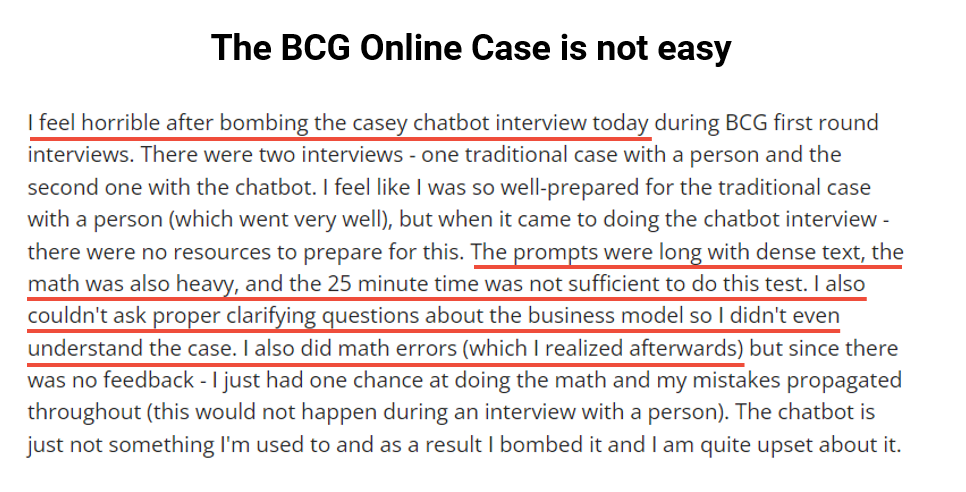
Understanding the BCG Online Case
The BCG Online Case (also called the BCG chatbot case or BCG Casey) plays a significant role in the recruitment process of the Boston Consulting Group.
Because the BCG Online Case evaluates if applicants have the skills to become best-in-class consultants before interviewing those applicants.
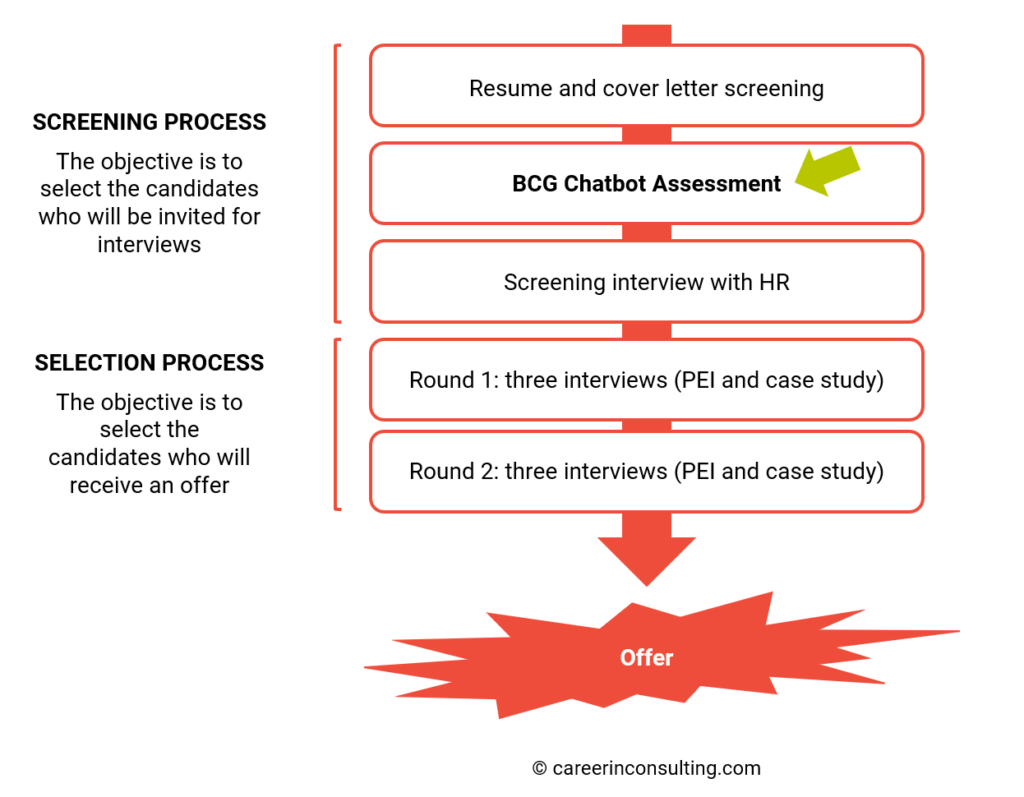
During this unique assessment, candidates engage with a chatbot, Casey, that presents a business case study.
Then, the case includes 8 to 12 questions assessing applicants’ critical thinking, data analysis, and strategic insights.
This online case experience aims to challenge candidates by offering a snapshot of the actual case interview process, simulating real-life problem-solving scenarios encountered by BCG consultants daily.
Finally, the candidates who fail the test are not invited for interviews.
Plus, they are usually banned for a 12 to 18-month period.
Key Components
The BCG Online Assessment is composed of a mix of question formats, ranging from multiple-choice to open questions, and culminates in a final video recommendation.
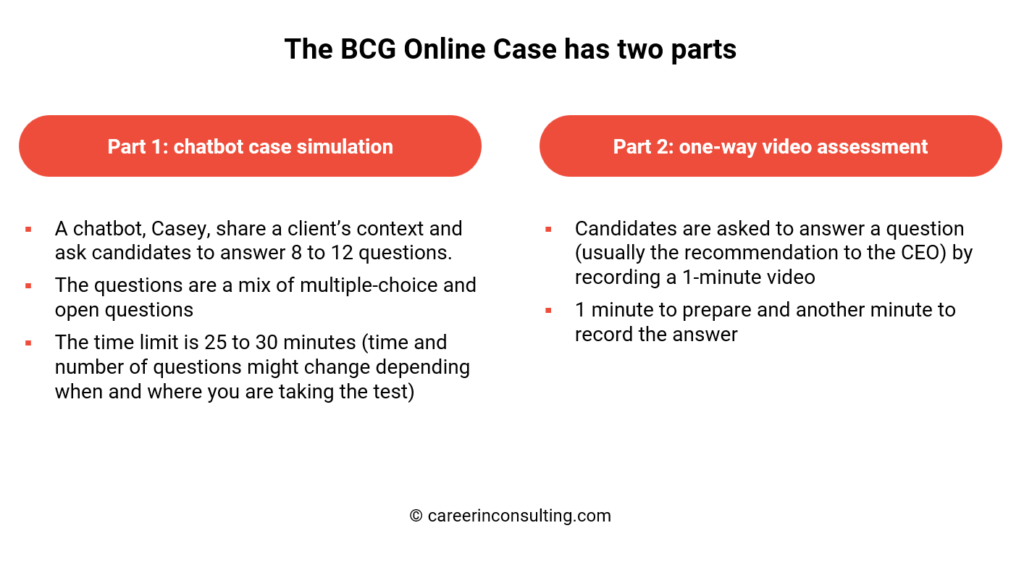
Candidates must complete the 8 to 12 questions within the 30-minute window, followed by a precisely timed 1-minute video on their webcam, presenting their final recommendation.
A sample multiple-choice question:
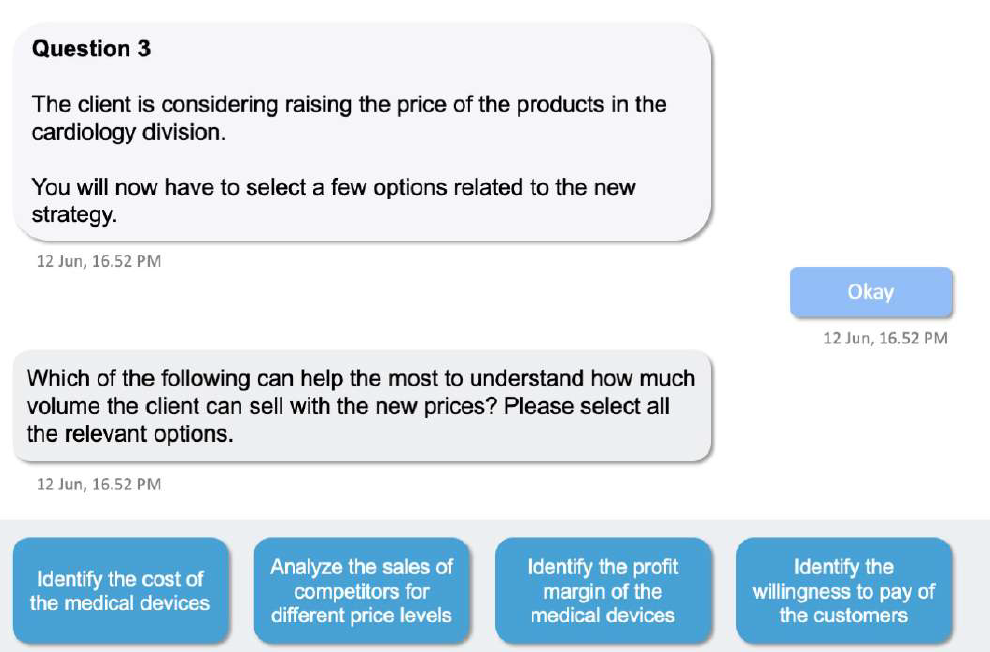
A sample open question:
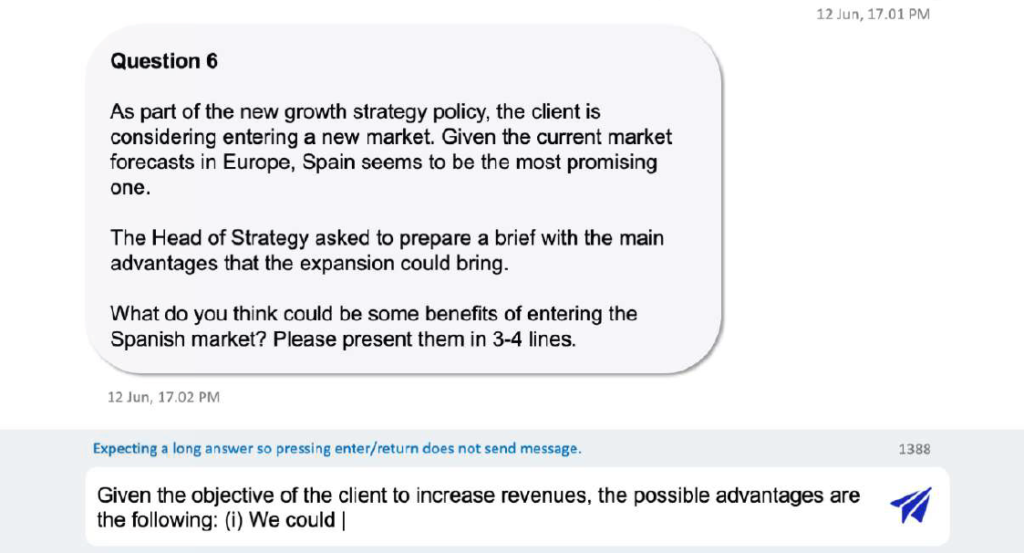
A sample one-way video question:
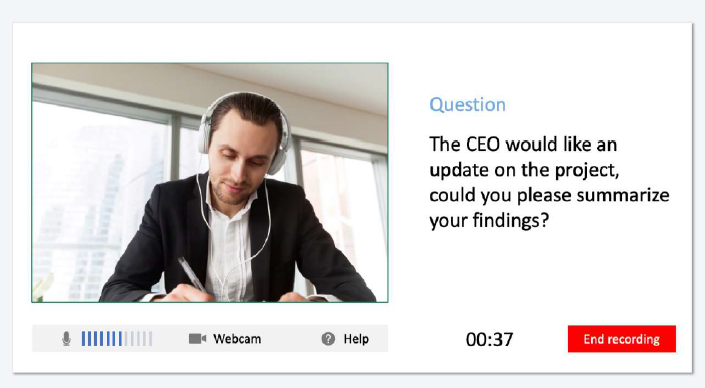
This unique format tests the candidate’s ability to think on their feet and communicate their ideas effectively, similar to a live case interview, making it an essential part of the interview process.
Important : The candidates must answer the questions one by one. In other words: there is no possibility to skip a question or pause the test.
Skills Assessed
A wide range of skills are evaluated in the BCG Online Case, including:
Problem-solving (structuring)
Business judgment
Logical reasoning
Mathematical aptitude
Graph reading and interpretation
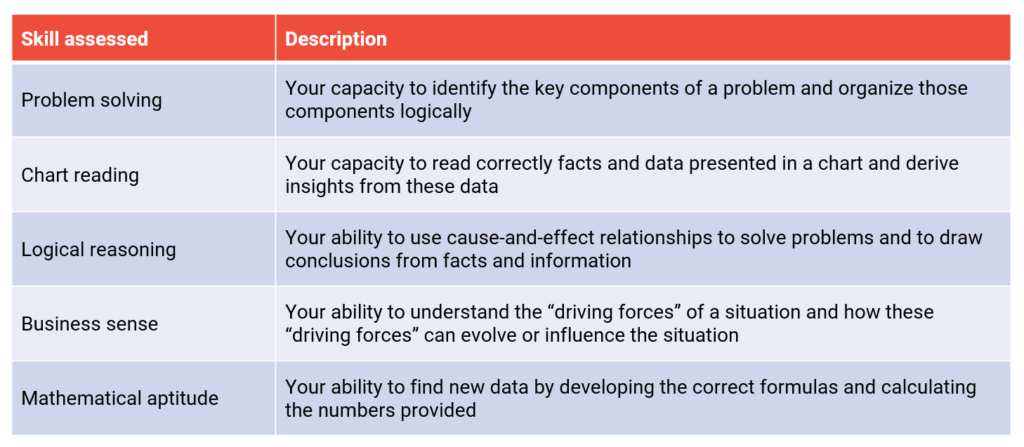
Candidates must demonstrate their understanding of business principles and showcase their overall business knowledge to excel in this assessment.
The BCG Online Case emphasizes proficiency in basic math concepts, data interpretation skills, and tackling math questions, all of which are crucial in solving real-life business problems.
Later in this guide, we’ll discuss how to master the different types of questions used to test those 5 skills.
But first, let’s have a quick overview of how the BCG Casey case compares to the aptitude tests used by the other top-tier consulting firms.
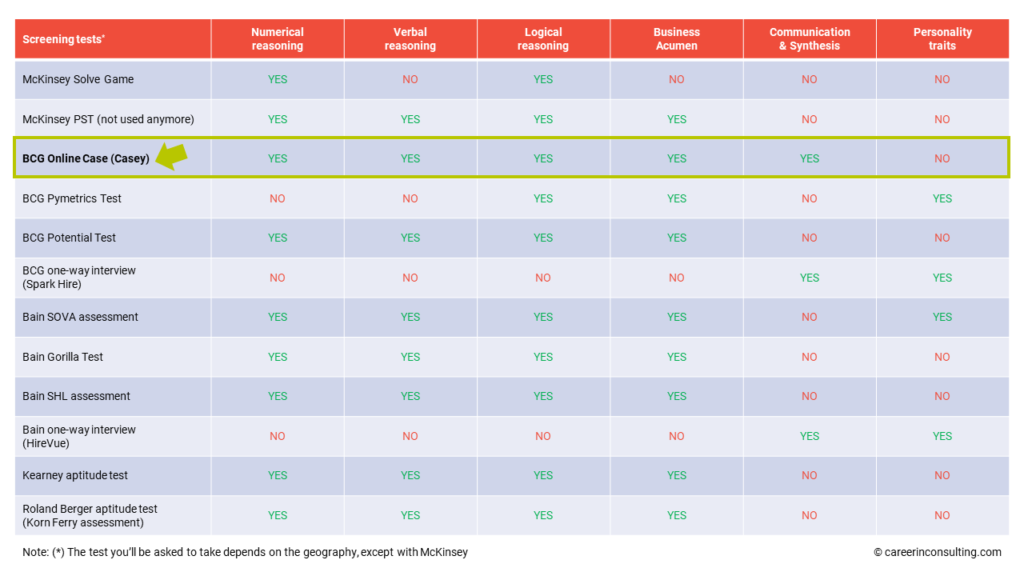
Next, let’s talk about the differences between the BCG Casey case and the traditional case interviews.
Differences Between BCG Online Case and Traditional Case Interviews
While the BCG Online Case shares some similarities with traditional case interviews, such as presenting a business problem to be solved, there are notable differences.
The most significant distinction is the use of Casey, a chatbot, which eliminates the need for a human interviewer and offers a more interactive experience through the BCG Interactive Case Library, which features various online cases.
Additionally, the online interview format presents unique time management challenges, as candidates do not receive the same level of interviewer feedback as in traditional case interviews.
Interaction with Casey Chatbot
In the BCG Online Case, success hinges on adapting to interaction with Casey, the non-human interviewer.
Candidates must navigate through questions without guidance, relying on their problem-solving skills and ability to structure their thoughts effectively.
Given the lack of feedback from the chatbot, a solid initial structure and a well-prepared approach are necessary to ensure smooth progression through the questions.
Time Management Challenges
In the BCG Online Case, time management is crucial as candidates must balance accuracy and speed within strict time limits.
The lack of interviewer feedback and the need to think and respond swiftly create a demanding situation, requiring candidates to prioritize questions, avoid getting stuck on difficult problems, and know when to skip or guess.
Calculator are allowed
Candidates can use a calculator during the BCG Casey test.
While it seems to make the test easier, especially for candidates with limited quantitative backgrounds, remember that calculators are not allowed during live case interviews.
Hence, sooner than later, all candidates must develop strong calculation skills.
Okay, now let’s talk about how to ace the different types of questions asked in the BCG online cases:
- Structuring questions
- Business acumen questions
- Math questions
- Chart questions
- One-way video (or synthesis) questions
Mastering the structuring questions
The structuring questions are most likely asked at the beginning of the assessment.
In this type of question?
The chatbot asks you to choose 2-4 answers among 8 different options.
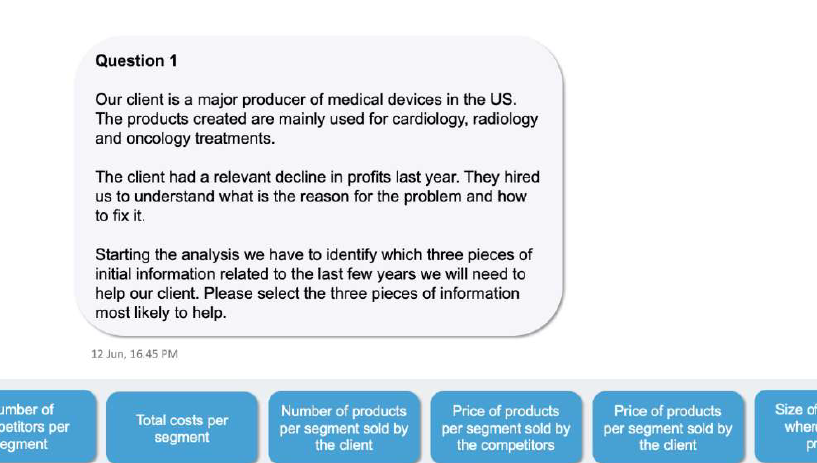
This is similar to creating an issue tree at the beginning of a live case interview.
Check this article if you don’t know what an issue tree is.
How to correctly answer Structuring questions
Use the following approach to answer the structuring questions:
Step 1: Understand which metric the client wants to optimize
Step 2: Read each option provided one by one and select ALL the options that can influence this metric
For example, the client wants to optimize its profits.
And the factors that influence the client’s profits include “total costs per segment,” “the number of products per segment sold by the client,” and “the price of products per segment sold by the client.”
How to develop this skill
Refining problem-solving skills is crucial for success in the BCG Online Case.
Practicing mock case interviews is the best way to develop your structuring skills.
All case interviews include structuring questions.
For instance, when developing an issue tree at the beginning of the case.
Or during the case, when answering brainstorming questions such as “Which factors influence the market growth?”
You can practice independently, with friends, or with an expert.
Regardless of how you practice, you must track your mistakes and improvement.
Practice Resources
You can find a library of 280 case examples on this page .
These case examples?
They are directly from top-tier firms’ websites or case books from prestigious universities like Wharton, Harvard, or INSEAD.
Get 4 Complete Case Interview Courses For Free

You need 4 skills to be successful in all case interviews: Case Structuring, Case Leadership, Case Analytics, and Communication. Join this free training and learn how to ace ANY case questions.
Acing the business acumen questions
Strong business judgment is what separates the good from the best consultants.
And BCG wants to assess how strong your business judgment is.
In other words:
They want to know if you understand how “business forces” can influence a situation or an environment.
But these “business forces” can take many forms, such as supply & demand, competition dynamics, regulation, etc.
Hence, you must develop a strong business culture to be able to understand how these “business forces” work.
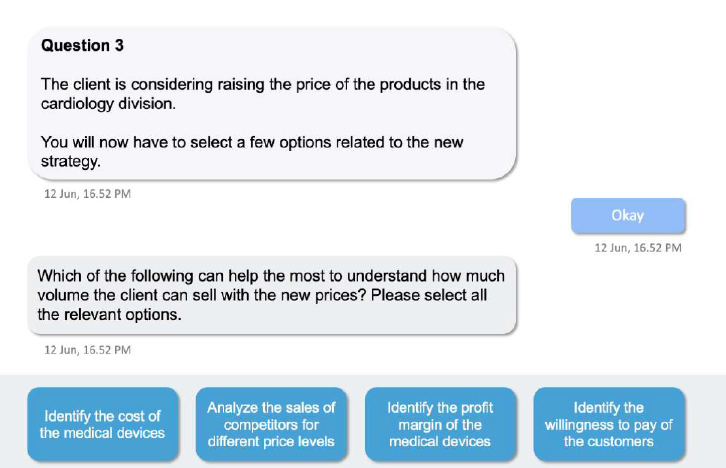
How to correctly answer Business Acumen questions
Use the following approach to answer the business acumen questions:
Step 2: Select, from the list of options provided, the factors that can influence this metric
For example, the client wants to optimize its pricing.
And the factors that influence the client’s pricing include “the willingness to pay of the customers” and “the sales of competitors for different price levels.”
One of the useful tactics for learning to ‘think business’ is when you learn about recent business events, try to figure out the (direct and indirect) implications of the event.
For example, imagine that the OPEC nations have decided to restrict oil supply.
A first direct implication can be that gas prices will increase, which means that oil company revenues will increase as well.
An indirect implication can be that the sales of SUVs will decrease, which means that Auto companies will be offering more sales promotions on SUVs.
Another indirect implication can be that the use of public transportation will increase.
And so on… you can think of dozens of other implications.
If you want to learn more about developing your business acumen, check out our coaching program on this page or sign up for our free case interview training.
I recommend reading business articles from the following websites:
McKinsey.com
Business insider ( the strategy section )
When reading these articles, try to understand the underlying business forces that created or solved a problem.
Mastering the Math questions
For all consulting firms, including BCG, a strong correlation exists between a candidate’s quantitative skills and the probability that this candidate will become a best-in-class consultant.
That’s why top consulting firms love asking quantitative questions in case interviews.
And the Casey chatbot interview is no exception.
Hence, you’ll have to answer Math questions like this one:
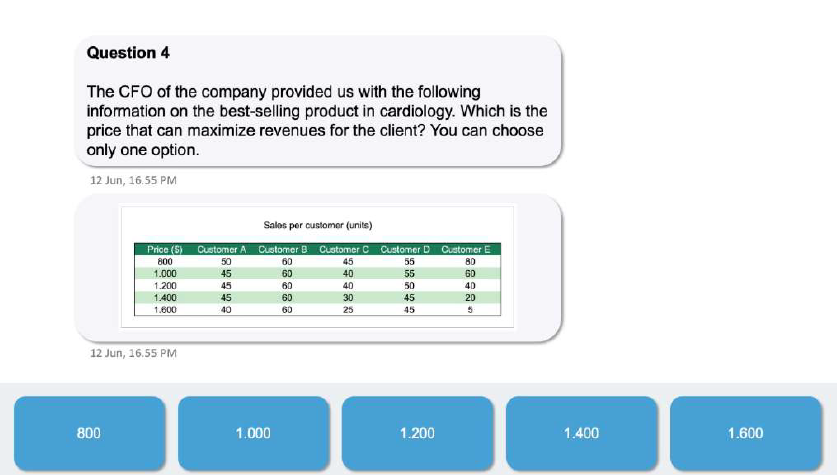
How to correctly answer Math questions
Use the following approach to answer the math questions:
Step 1: Understand the objective and the data presented (units, titles, etc.)
Step 2: Develop the formula you need to answer the question
Step 3: Plug the numbers provided in your formula and do the Math
Step 4: If you have time, do a quick sanity check of your answer
For example, the client wants to optimize its pricing to maximize revenues.
Since revenues are equal to volumes times price, you need to add all the units per price level and multiply the total volumes by the price levels.
The answer will be the price level that maximizes the client’s revenues.
Note : calculators are allowed during the BCG test.
To sharpen your quantitative skills, practice with mock quantitative tests such as:
Mock GMAT Tests: These tests are excellent for practicing various quantitative problems.
Case Interviews: Simulate the real experience using case interviews that include math questions.
Mock McKinsey PST or BCG Potential Test .
Don’t limit yourself to traditional methods.
Various online platforms and apps are designed to help you practice mental calculations and case-specific math problems.
By mastering case interview math, you’re not just showcasing your ability to crunch numbers.
You’re proving that you can think critically, make data-driven decisions, and lead a case to its logical conclusion.
Acing the Chart questions
Analyzing lots of data is part of the daily routine of a consultant.
And these data come in many forms: charts, data tables, texts, etc.
Hence, you’ll have to answer Chart questions like this one:
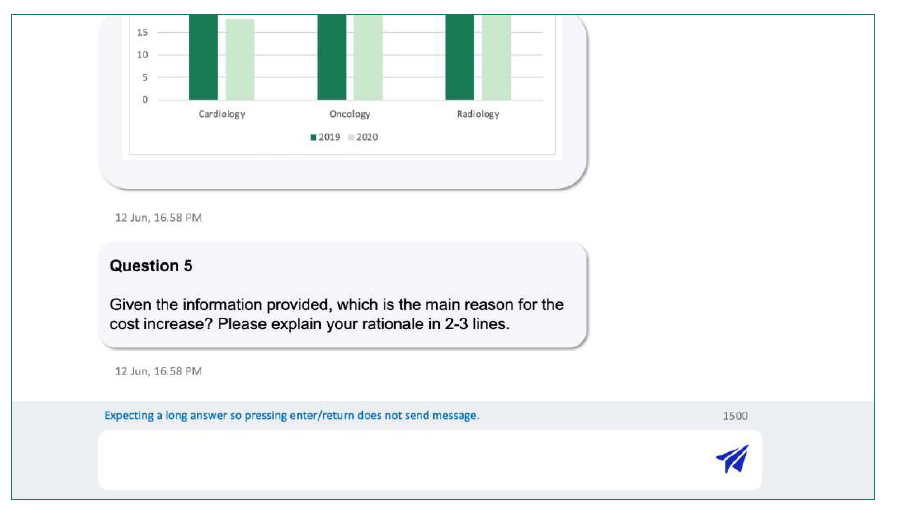
To answer a chart question, you might have to analyze more than one chart.
How to correctly answer Chart questions
Use the following approach to answer the chart questions:
Step 3: Find the data you need in the charts presented
Step 4: Plug numbers from these charts into your formula and do the math.
This is important to do step 2 before step 3.
You don’t want to jump aimlessly in the chart.
Instead, have a clear goal (know what you’re looking for) before wasting your precious time reading the chart.
As for the Math questions, you can practice with mock quantitative tests like GMAT, McKinsey PST, or BCG Potential test.
Additionally, this article shares more tips on developing your analytical skills (including chart reading).
First, you can practice with GMAT tests.
Here are some examples .
Besides, visit websites full of charts like The Economist, The Wall Street Journal, etc.
Find charts, draw conclusions from these charts, and read the article to check if your conclusions make sense.
Also, practice with the case examples you can find in these case books .
Additionally, here are more resources:
- SHL practice tests ( here )
- SHL verbal reasoning questions ( here )
- SHL numerical reasoning questions ( here )
- SHL inductive reasoning questions ( here )
- Free aptitude test examples ( here )
- Kearney mock recruitment test ( here )
- McKinsey PST examples ( here , here , and here )
Finally, you can use a platform like JobTestPrep to practice with tests that mimic real tests.
Tackling the one-way video question
With this question, BCG will test your communication skills and capacity to synthesize your work.
Most of the time, the one-way video question asks you to give a recommendation to the client’s CEO.
The one-way video question looks like this:
How to correctly answer One-Way Video questions
Use the following approach to answer the one-way question:
Step 1: Repeat the objective
Step 2: Provide an answer-first conclusion (following the pyramid principles)
Step 3: Discuss potential next steps and risks
Your answer is very similar to the conclusion you must provide in a real-life case interview.
For instance:
“ Our objective was to understand why profits declined and how to fix this problem. The drop in profits comes from an increase in our client’s labor costs. A solution is outsourcing some administrative activities in a low-labor-cost country such as [X]. For the next steps, I would estimate the impact of our client’s labor costs and analyze the potential risks, such as the impact on our client’s brand image and quality of services. “
There is a must-read book if you want to become a consultant.
The pyramid principle by Barbara Minto.
If you don’t have this book in your library, buy it now.
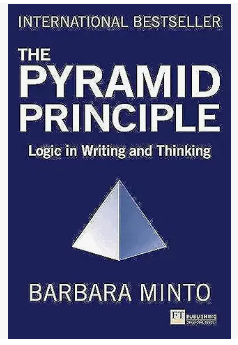
As for structuring questions, use this library of 280 case examples to practice giving recommendations and improving your communication skills.
Frequently Asked Questions (and final tips)
Is the online case important for bcg.
The Online Case is an integral part of the BCG recruitment process and provides the firm with a way to evaluate essential consulting skills, such as structuring, business sense, math skills, graph interpretation, and synthesis. As such, it is highly important for BCG.
What is BCG online case experience?
BCG Online Case Experience is a 25-minute assessment that challenges candidates with a fictional client case presented by the online chatbot ‘Casey’, requiring them to answer 8-12 questions to demonstrate their business skills.
How much does the BCG online case matter?
BCG online case is important because if your performance on the test isn’t up to the mark, then it doesn’t matter what other documents you provide; you won’t be invited to the first round of interviews.
What is the passing score for the BCG online case?
BCG’s online test is not used to filter candidates, but an average performance would be considered a good result with 70% of questions answered correctly.
What is the role of the chatbot, Casey, in the BCG Online Case?
Casey is an AI-powered chatbot that facilitates the BCG Online Case, assessing candidates’ critical thinking, data analysis, and strategic insights through various question formats.
Will I have to take the test from home?
Yes. BCG will send you a link to take the test.
Can I pause the game once it has started?
No. You must go through all the questions at one time once you have started.
Hence, it’s important to have an effective time management strategy.
Effective time management strategies for the BCG Online Case include avoiding getting stuck on difficult problems and knowing when to skip or guess.
Any last advice?
Before starting the test, ensure you are in a silent room (mute your phone) and check your internet connection.
BCG online case: final words
In conclusion, acing the BCG Online Case requires thorough preparation, mastery of relevant skills, and effective time management.
So, I hope you enjoyed this guide about the BCG online case.
And that you feel more confident about taking this online test, paving your way to a successful career with the Boston Consulting Group.
Now, I’d like to hear from you: What’s your biggest challenge in answering the 10 questions?
Managing your time effectively?
The one-way video assessment?
The numerical questions?
Let me know by leaving a quick comment below right now.
Leave a Comment Cancel Reply
Your email address will not be published. Required fields are marked *
You need 4 skills to be successful in all case interviews: Case Structuring, Case Leadership, Case Analytics, and Communication. Enroll in our 4 free courses and discover the proven systems +300 candidates used to learn these 4 skills and land offers in consulting.
BCG Case Interview Guide
The Boston Consulting Group , more commonly known as BCG, is a global strategy consulting firm with over $8bn in revenue and 21,000 employees worldwide. It is the second-largest consulting firm in the world by revenue and is part of the prestigious MBB group (McKinsey, Bain, BCG).
Every year BCG receives thousands of job applications from undergraduates, masters, and MBA students across the globe. Working at BCG is considered one of the most highly reputable graduate jobs in the market and therefore is incredibly competitive. The acceptance rate at BCG is well below 1% and being an exceptional student is rarely enough.
The BCG case interview is the cornerstone of their application process and is a problem-based interview where candidates are required to solve a business problem with limited information.
- 1. What BCG is Looking for
With such an abundance of talent applying for jobs at BCG they are particular about the skills and personality traits they are looking for and they go beyond academic excellence. The type of work that BCG does on a daily basis for their clients requires a mix of quantitative ability, business acumen, and relationship building .
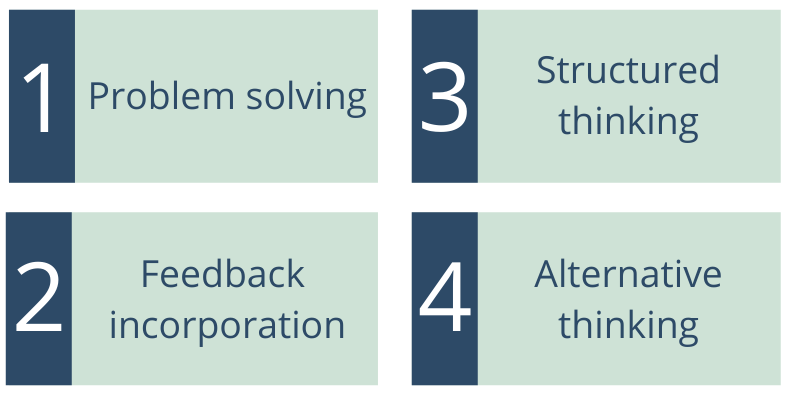
The traits they state they are looking for on their website are:
Problem-solving – The problems that BCG works with their clients on are complex and natural curiosity and problem-solving skills are critical.
Structured thinking – The complexity of problems means it is easy to get lost in insignificant details and so BCG is looking for structured thinkers that can take a pragmatic approach to the problem in order to ensure analysis is comprehensive. This is at the core of the BCG case interview .
Feedback incorporation – The culture of strategy consulting is one of high performance and so whilst consultants need to be confident they also need to have the humility required to take on feedback and change their opinion when the facts present the change.
Alternative thinking – The unique nature of the client problems that BCG consultants face means that often there is not a best practice approach to solving it that the team can take, therefore, alternative approaches are highly valued by BCG.
- 2. BCG Application Process
There are four steps to the BCG application process, resume and cover letter , online assessments , and first and then second-round interviews.
The first step of the BCG application process is the same as most other graduate jobs. Applications for BCG are straightforward and done online. They require a resume and a cover letter as well as some personal details. The cover letter needs to be unique to BCG and not a generic cover letter with the company name changed.
The online assessments consist of two different tests; the BCG potential test and the BCG Pymetrics game assessment . These are the filtering mechanisms that test candidates' quantitative skills and personality traits.
The first-round interviews are similar to those at Bain, are usually with a junior consultant (3-6 years experience), and are where you will first be tested with a case interview . You will typically have 2 interviews both starting with fit questions such as ‘ Why consulting? ’ or ‘Tell me about a time when…’ for the first 15 minutes and then followed by a 45-minute case interview .
The second-round interviews follow the same structure as the first-round interviews but are conducted by more senior members of the team , usually directors, and junior or senior partners. These consultants will be more rigorous in their assessment and provide a final hiring decision.
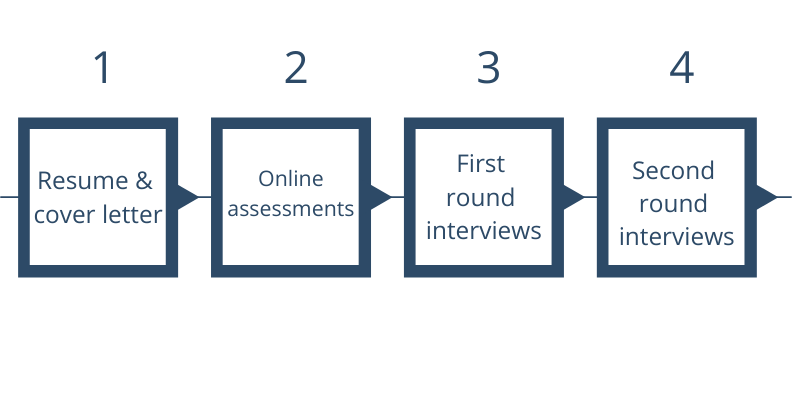
- 3. Types of Interviews
BCG use three types of interview across their network: case interview, experience interview, and written case interview (also known as a structured case interview). The most common interview is the case interview but you need to be prepared for all three unless the recruiter states the type of interview you can expect.
- 3.1 Case Interview
BCG uses case interviews with the same weighting as other strategy consulting firms and typically a candidate will face four separate interviews before they receive a job offer . The case questions are based on real-life examples and the interviewers will have worked on the problem themselves, this allows them to provide context and data easily.
BCG is looking to test candidates’ ability to do the day-to-day work that will be required of them. On their website this covers:
Problem-solving
Alternative thinking
Structured analysis
Communication
Read our full guide on how to work through case interviews because these skills will be applicable for all case interviews.
- 3.2 Experience Interview
The experience interview is normally integrated into a case interview or written case interview with the first 15 minutes of a 60-minute interview devoted to the experience and fit questions. The questions are closely aligned to other job interview questions but strategy consultants will want to see a certain approach to answering them. The types of questions they will ask are:
- Why consulting?
- What is your greatest achievement and why?
- When have you led a team and how did you approach the role?
- What is a difficult decision you have made in the last year?
- What is an example of a time when you showed initiative and leadership?
- What do you most like to do in your free time?
- Why would you be a good fit for one of our project teams?
The key to these questions is to develop a structure that can be applied to all of them . By structuring your answer, you will show that even when discussing non-business-related topics you apply a considered approach to your answer.
- 3.3 Written (structured) Case Interview
The written case interview assesses the same attributes as the case interview and requires the same skills. However, instead of working through the case with the interviewer, you are given a large document pack (20-30 pages) that contains all the information required to answer the case. The information pack is dense and the time provided to read and digest it is small (c.10 minutes). This means that you are required to find the key pieces of information, interpret data quickly and structure a recommendation to present back to the interviewer under time pressure .
As with the case interview, there is no correct answer and the important part of your answer is the consideration of trade-offs for making decisions and comparing the possible strategic decisions the business in question can take . The interviewer will test your thinking and recommendations to see how robust your conclusions are and the steps you took to get there.

- 4. Case Interview
The consulting case interview is the cornerstone of every strategy consulting firm’s interview process due to the ability to replicate the problems and challenges of the work they do.
To score well in a BCG case interview, you must meet the criteria laid out above and you can do this following a structured approach to case interviews . The structure of a BCG case interview is as follows:
- Situation and problem
- Hypothesis validation
- Framework development
- Root cause analysis
- Mathematical calculation (sometimes)
- Creativity test (sometimes)
- Recommendation
At the start of the case, the interviewer will outline the context and the problem to be explored. An example might be:
“A high street retailer wants to cut costs by 30% in response to the Covid-19 pandemic, how would you approach this?”
You would then be expected to put forward an initial hypothesis on what the answer might be and explain your intention to prove or disprove it.
From there you will be expected to develop a framework to conduct your analysis and test it with the interviewer.
If your framework is MECE and you explore it correctly then you will find the root cause of the issue for the client (in this case where costs can be reduced) and begin calculations if relevant.
The creativity test is when the interviewer asks you for an alternative to your findings or recommendation e.g. “Okay, the client says they do not want to shut stores, how else can they reduce cost?” They may ask this more than once and it tests the candidates' ability to think of alternatives, even if their answer is appropriate.
Finally, you will be asked to provide a recommendation whereby you need to synthesize your findings and give a clear and concise proposal.
For more information on how to approach and solve case interviews, you can read our case interview guide.
- 5. Additional Tips
Case interviews are pressurized situations where your anxiety levels are heightened and you don’t have the safety net of notes or the internet to fall back on.
For in-person interviews, it is common that one of the questions will have a mathematical element or a market sizing question included . These require long maths calculations without a calculator. If you haven’t practiced long addition, multiplication, division, or subtraction recently then it is a good idea to do so. Being quick at maths shows your competent quantitative skills and reduces unnecessary pressure during the interview, increasing your overall performance.
We have published guidance and practice questions dedicated to case interview maths, that will give you an idea of what to expect.
As with maths, practicing case interviews is the best way to improve your performance. Through practice, you will begin to develop a robust approach that satisfies the structure and framework components of the case and you will recognize how to navigate the case successfully .
If you are applying to BCG then you are probably applying to other strategy consulting firms too, this practice will be relevant to all of the firms you apply to as they all use case interviews in their application process.
- Apply structure to everything
The key requirement of a candidate in a case interview is the application of structure, specifically with a MECE approach . As mentioned above, you can even apply structure to the FIT questions and it is recommended you do so.
An example answer to the question ‘walk me through your CV’ would be to segment your experience into 1) Experience relevant to consulting 2) Experience not relevant to consulting and then briefly cover the experience you have in each bucket. This shows you understand what consulting is and what is relevant and also a key skill of a consultant – structured thinking .
If you can demonstrate robust structured thinking in your interview, you will score highly.
Continue to Learn

Bain Case Interview Guide
Are you facing a Bain case interview? We have the ultimate preparation guide for you!
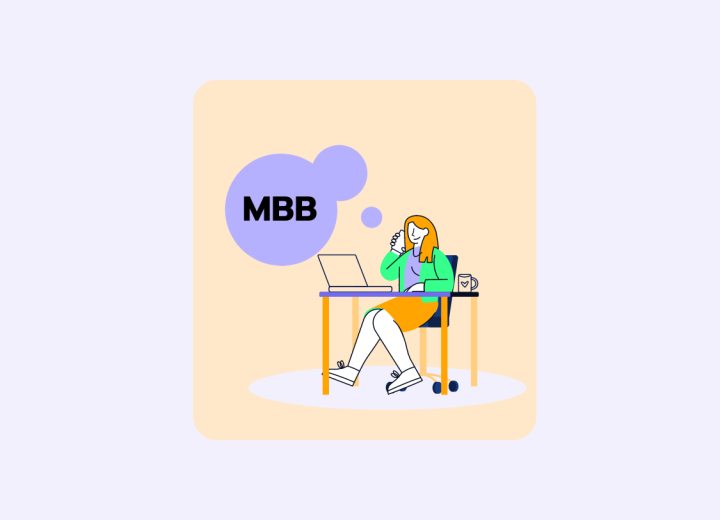
MBB Consulting Salary – How Much Money Can You Make at MBB?
Get insights from a top consultant!

The Difference Between MBB and the Big Four in Consulting
Dive into the world of the consulting industry now

- Select category
- General Feedback
- Case Interview Preparation
- Technical Problems
Add/Drop period ends Monday, September 9th at 11:59 pm. More information can be found through our How to Guide.
- Experiential
- SBS Pathways Center
- Anthropology
- Communication
- Landscape Architecture
- Legal Studies
- Managerial Economics
- Political Science
- Public Policy
- Resource Economics
- Social Thought & Political Economy (STPEC)
- Sustainable Community Development
- SBS Exploratory Track
- Minors, Certificates, and More
- SBS 4+1 Accelerated Masters Programs
- What are Career Communities?
- Advertising / Public Relations / Marketing
- Business / Entrepreneurship / Management / Consulting
- Health / Research / Education / Culture
- Environment / Natural Resources / Sustainability
- Finance / Investment / Real Estate / Insurance
- Government / Public Policy / International Relations
- Law / Legal Services / Criminology / Forensics
- Media / Journalism / Entertainment
- Non-Profit / Social Justice / Activism
- Technology / Data / Analytics
- What Are Diverse Communities?
- SBS RISE: Remedying Inequity through Student Engagement
- Black, Indigenous & Students of Color
- First Generation Students
- International Students
- LGBTQIA+ Students
- Student Athletes
- Students with Disabilities
- Students with Financial Need
- Transfer Students
- Women in the Workforce
- Graduate School
- Explore Career Outcomes
- International Careers
- National Scholarships / Fellowships
- Pre-Law Advising
- Year of Service / Volunteering
- Undergraduate Students
- Faculty and Staff
- Admitted Students
- Prospective Students
- Apply for Scholarships and Awards
- Declare an SBS Major
- Meet with an Academic Advisor
- Meet with an Academic Dean
- Suggest New Courses
- Petition for Late Add
- Petition for Pass/Fail
- Withdraw from a Class/Petition for Late Withdrawal
- Petition for Course Credit Overload
- Release Academic Information (FERPA)
- Withdraw from the University
- Apply for Funding for Internships, Study Abroad, Research, and other High-impact Opportunities
- Assess My Skills and Interests
- Explore Majors
- Find an Undergraduate Research Opportunity
- Get Involved on Campus
- Learn about Different Career Paths
- Study Abroad
- Take Courses through the Five Colleges
- Domestic Exchange
- Apply for Scholarships to Support Research or Internships
- Develop My Job Search Skills & Strategy
- Look for Internships and Jobs
- Meet with a Career Advisor
- Negotiate an Offer
- Network and Connect with Mentors
- Prepare a Resume and Cover Letter
- Prepare for/Navigate a Career Fair
- Prepare for an Interview
- Register an Internship for Credit
- Write a Personal Statement for Graduate School
The BCG Online Case – preparation is the key
- Share This: Share The BCG Online Case – preparation is the key on Facebook Share The BCG Online Case – preparation is the key on LinkedIn Share The BCG Online Case – preparation is the key on X
Over the past couple of years, consulting firms have introduced digital screening tools to weed out weak candidates, saving them time in the screening process.
The BCG Online Case is one such example.
The Online Case puts candidates through a rigorous experience that is part case interview, part GMAT-style test.
And, similar to the traditional case interview, the Online Case allows the firm to get a sense of your logical reasoning skills and quantitative aptitude.The BCG Online Case is definitely a little different, and thus requires focused preparation. Get a head-start by reading our new article on the Online Case. Click here to dive in!

BCG case interview - How to prepare (2024)

BCG case interviews don't have to be complicated. Over the years we have managed to develop a simple step-by-step system to get you from "What are case interviews like at BCG?" to "I am confident I can get a job at BCG".
We have helped more than 30,000 candidates prepare for their consulting interviews, and in this guide, we have summarised the most important things you need to know to prepare for your BCG case interviews.
Here's an overview of what we'll cover:
- Interview process
- Case questions
- Fit and PEI questions
- Preparation tips
Click here to practise 1-on-1 with BCG ex-interviewers
Part 1: bcg interview process and skills tested .
The first step towards getting an offer at BCG is understanding the process you will have to go through and the skills BCG will be testing you on.

1.1 Three steps to get an offer
Let's first step through the different recruitment stages at BCG. In most countries this process entails 3 steps:
- Resume and cover letter screening
- First round interviews
- Second round interviews
First, recruiters will look at your resume and assess if your experience matches the open position. This is the most competitive step in the process—we’ve found that 90% of candidates don’t make it past this stage.
You can use this free resume guide and this free cover letter guide to help tailor your application to the position you’re targeting.
And if you’re looking for expert feedback, you can also get input from our team of ex-MBB recruiters , who will cover what achievements to focus on (or ignore), how to fine tune your bullet points, and more.
After that, you must complete the interviews. BCG uses 4 tools to assess candidates during its first and second round interviews:
- Fit / PEI questions
- BCG Potential Test/Online interview
- Written cases
You will get a combination of Fit / PEI questions and case interview questions in ALL your interview rounds. Your interviewer will typically ask you a one or two Fit / PEI questions (~10mins) and then move on to a case interview (~30 to 40mins). We will cover the type of Fit / PEI questions and case interviews you can expect at BCG in details below.
In addition to fit and case questions, BCG also uses the BCG Potential Test or Online Case as well as a Written case.
The BCG Potential Test is typically used in FIRST ROUND interviews. There are two versions of the test. A computer based one which includes 23 questions to be answered in 45mins. And a paper based one which includes 53 questions to be answered in 50mins.
The BCG Potential Test is frequently replaced by BCG's Online Case. This version is a shorter assessment, with around 10 questions, which lasts about 30 minutes. The questions are open-ended, and you will have to move through them one at a time.
BCG also sometimes uses a written case in SECOND ROUND interviews. So far we have only heard of this being used in the US. For this written case, you will be given a set of documents, which you will use to answer case questions. You will then have 2 hours to answer these questions in the form of a 3 to 5 slide presentation, which you will have 15mins to present to your interviewer.
In a recent interview , BCG revealed they were hiring about 1,000 employees per year. As you probably know the competition for these spots is fierce. The acceptance rate at McKinsey is around 1% according to the firm's Managing Director. And we suspect that the intensity of the competition is similar at BCG.
This probably sounds intimidating. But the good news is that in our experience, it can actually become pretty straightforward to succeed at a BCG interview if you prepare in the right way.
1.2 Timeline to get an offer at BCG
When preparing for your BCG case interview, it can be difficult to know when to expect each stage of the interview process. To help illustrate a typical timeline, we've created the below overview of BCG's recruitment schedule. As a rule of thumb, you can expect the whole process to take 4 to 6 weeks.
Please note: this is meant to give you a general overview, and may not reflect your specific interview timeline. Actual interview timelines depend on a number of factors (e.g. Experienced hire vs. University hire). The below is based off of the expected recruitment timelines at the University of Chicago (an MBB target school). You can find the original document from the University of Chicago here .

1.3 Core skills to demonstrate to get an offer at BCG
There are three core skills BCG will test you on during their case interviews:
- Problem solving and maths
- Creativity and business sense
- Communication
First, BCG will have already started testing your problem solving and maths skills with their BCG Potential Test. But virtually all the case interviews you get will continue testing this skill. In practice, this means that you need to be able to do mental maths quickly and accurately. And to solve the problem you are given in a clear and structured way.
Then, BCG will also test your creativity and business sense. As a consultant, you will often have to generate innovative ideas to solve the business problem at hand which is why consulting firms want to test you on this. For example, your interviewer could ask you to generate ideas on how to attract more visitors to an amusement park, or how to decrease the park’s costs.
Finally, your communication skills will also be tested throughout the process. Cracking the case is only half the battle. The other half is doing it in a way that is structured and easy to understand for your interviewer. In practice, that means you should follow a step by step approach to solve every question you get.
To get a feel for what strong and structured communication sounds like, take a look at the BCG & Bain live case interview extract included in part two below.
Part 2: BCG case questions
Now that you know what to expect in your BCG interviews, let's dive into the different parts you need to prepare for. We'll begin with case questions. The video below will give you a good overview of what BCG case interviews are like:
2.1 BCG case interview structure
Case interviews can be challenging, but the good news is that they can be broken down into seven different types of questions. If you can consistently solve each type of question, you will be able to consistently crack cases, which will help you get an offer at BCG. Learning to solve each type of question should therefore be your objective as you prepare for interviews.

Let’s take a look at each of them one by one:
- Framework development
- Framework exploration
- Quant question – Data provided
- Quant question – No data provided
- Creativity question
- Recommendation
You can read more about case interviews and how to prepare for them, in our ultimate case interview guide . The next few paragraphs will summarise the seven types of case questions mentioned above.
In every case, the first thing your interviewer will do is lay out the problem faced by the featured company. Then, they will ask you the areas you would look at to solve the company's problem. This is called the framework development question. If you would like to learn more about frameworks you should take a look at this blog post .
In certain types of business problems, you will then have to explore the framework to find the root-cause of an issue. This is the framework exploration question. For instance, if the objective of the case is to find why the company profits are going down, you will have to EXPLORE the framework and test different hypotheses. For example, profits could be going down because of revenues, costs, or both.
Note that you will not always get a framework exploration question. Your interviewer will sometimes jump straight into quantitative questions. For instance, you may be asked to analyse which countries Starbucks should go into next. The problem is not about finding the root-cause of an issue, and exploring your framework therefore makes less sense.
Next, you will usually have to solve a quantitative question to further understand the business problem at hand. There are essentially two types of quantitative questions in case interviews. Questions where the interviewer provides you with graphs and tables. And questions where no data is provided and you have to make assumptions by yourself.
In addition, your interviewer will also often ask a creativity question. These are typically open-ended questions such as “what can the company do to justify increasing its product prices?” These questions aim at assessing your capacity to generate qualitative ideas to solve the problem your client is facing.
Finally, at the end of the case your interviewer will ask you a recommendation question. This will test your ability to summarise your thoughts on your clients’ situation and what they should do as a result.
The order and format of these questions may vary slightly between your different interviews. But you will invariably come across them at some point during your cases and should be ready for them.
2.2 BCG Interview questions
A great way to learn the 7 different types of case questions, is to practise with cases provided directly by BCG. On their website, BCG has a case library where you can learn the same kind of scenarios you might encounter on your BCG case interview.
Check out BCG's case library here , and try to map the questions in each case to the 7 different question types we have listed above.
You should also watch mock case interview videos on YouTube . We add pause points to our mock interviews so that you can practise alongside the candidate. The video below shows Gero, ex-BCG consultant turned interview coach, giving a high-quality answer to a revenue problem case.
As you're practising, try to replicate real-life conditions as much as possible. In the next few sections, we'll highlight a few tips that will help you perform on the candidate-led cases BCG uses. If you want even more tips, check out our larger post about case interview tips .
2.3 Tip #1: Make a hypothesis at the right time
One of the questions candidates often ask us when preparing for case interviews is: “Should I use a hypothesis? And if so, when should I use one?” Some coaches such as Victor Cheng from caseinterview.com use a hypothesis all the time. But doing this in practice can feel quite artificial during your case interviews.
For instance, if you are trying to decide what type of new beverage Coca-Cola should launch next year, using a hypothesis is possible but does not add a lot of value. You could start by saying something like: “I’m going to hypothesise that Coca-Cola should launch a new diet orange juice next year because customers are more and more health conscious”.
But, this would be nothing more than a wild guess at the beginning of a case. This is why a lot of candidates are uncomfortable using a hypothesis driven approach. In real life, the main situation when consultants use a hypothesis is when they are looking for the root-cause of an issue.
For instance, when they are trying to understand why the profitability of a company has decreased . The root-cause could be many things: lower price, lower volume, higher variable costs, etc. Using a hypothesis in these cases is actually very helpful because it enables consultants to stay really focused and to methodically test all the potential sources until the real issue is identified.
Our recommendation is therefore to do the same in your cases and to only use hypotheses in framework exploration questions where you are looking for the root-cause of an issue.
2.4 Tip #2: Lead the case
Another important feature of candidate-led cases at BCG is that the interviewer will want you to take lead on the case. This is why BCG cases are often called “candidate-led” cases. After you present your framework to your interviewer they won’t tell you what to do. They will expect you to take the lead and to suggest a next step.
This can be surprising at first, if not intimidating. However, there is a very simple way of dealing with this. Every time you answer one of your interviewer’s questions you should essentially suggest a next step.
For instance, if you have just presented your framework, you should say something like: “To summarise, I think we should look into revenues and costs to solve this problem. As a next step, my suggestion is to analyse revenues in more detail. I understand revenues have been going down. Would we happen to have any details on how fast that decrease has happened? And how it has impacted the company’s different products?”
By suggesting a next step and asking for more information, you are taking a lead on the case. Interviewers are instructed to be well-intentioned. If you get stuck or are not on the right track they will nudge you in a different direction.
2.5 Tip #3: Only make data assumptions if you have to
Another important aspect of candidate-led interviews at BCG is that they will require you to make more data assumptions than interviewer-led cases at McKinsey . This is because BCG tends to use more quantitative questions without giving you any data, but McKinsey is less likely to do that.
One question we often get from candidates is: “When should I make a data assumption vs. directly ask the interviewer for the data?” The answer to this is actually very straight forward. You should always ask for the data first. And only if your interviewer tells you the data is not available should you make data assumptions.
A lot of candidates worry about asking for data that’s not available. But in reality that’s actually perfectly fine. It’s really hard for you to guess which data points the interviewer has or doesn’t have. As a result, if you ask for a data point that your interviewer would like you to estimate, they will simply tell you that they don't have the data available.
2.6 Tip #4: Follow the BCG case interview dress code
Another question that candidates often wonder about before their first case interview with BCG, is how they should dress. There are a few things that you should keep in mind when it comes to the dress code. We've summarised some highlights below, and you can also read more in our article on the consulting interview dress code for men and women .
First, follow recruiter instructions. If your HR contact tells you to dress business professional, do it. If they say business casual, dress accordingly. If they haven't specified the dress code, you should feel free to ask your recruiter. They get these questions all the time and will be happy to answer.
Second, don't try to impress interviewers with how you dress. You should dress conservatively for your BCG interview. This may surprise you, but your goal for attire should be to NOT stand-out. Your BCG interviewers are far more interested in your analytical and communication skills than your wardrobe.
At the end of the day, probably the only reason an interviewer would remember your attire is if you dressed badly. So don't take unnecessary risks, and avoid wearing anything flashy or attention-grabbing, like big jewelry and cuff links. Below is the typical attire for BCG case interviews, for both men and women.
Typical dress code for men:
- Suit in a neutral color (e.g. black, grey)
- Button-up shirt in a simple style and color (e.g. white, light blue)
- Tie without flashy patterns
- Black or brown dress shoes that go with your suit
Typical dress code for women:
- Conservative dress or pantsuit in simple colors (nothing shiny or bright)
- If wearing a pantsuit with a blouse, white is standard for the blouse
- No large or loud jewelry, small and simple items are appropriate
- Shoes should be conservative and comfortable
Use your judgment in choosing your interview attire. Asking your HR contact for the dress code is helpful, especially for events or mixers where it's less clear. When in doubt, choose clothes that are professional and conservative. It's better to go unnoticed than for interviewers to be distracted by your wardrobe choices.
Next, we'll turn our attention to the fit and PEI questions that BCG uses.
Part 3: BCG fit and PEI questions
In addition to case interviews you will also get behavioural interview questions at BCG. There are two types of behavioural questions you should be aware of:
- Fit questions (~66% of questions) . These are questions such as "Why consulting?" or "Why BCG?" They aim to assess whether you are good fit for the firm.
- Personal Experience Interview (PEI) questions (~34% of questions) . These are questions such as "Tell me about a time when you took a leadership role" or "Tell me about a time when you have to deal with ambiguity." They aim to assess if you have the soft skills required to be a good consultant.
Let's step through the top 5 fit questions first and then the top 5 PEI questions. The percentages we are sharing below come from analysing data for BCG interviews on Glassdoor.com .

3.1 Top 5 fit questions asked by BCG
Let's step through the top 5 fit questions you will come across in the behavioural part of your interview with BCG. Note that the percentages for the top fit questions discussed here add up to 100%. But as mentioned above, altogether fit questions just make 2/3rds (~66%) of behavioural questions asked by BCG interviewers.
So here is the top 5:
- Why consulting? (23% of fit questions)
- Why BCG? (21% of fit questions)
- Walk me through your resume (7% of fit questions)
- Tell me something that's not on your resume (7% of fit questions)
- What's your career plan / 5-year plan? (6% of fit questions)
- Other (29% of fit questions)
We've covered in detail what you should answer to the " Why consulting? " and " Why BCG? " questions in the past. Questions 2 to 4 are also often asked at other firms and we have covered them in our guide on consulting interview behavioural questions .
But one question that seems to come relatively frequently at BCG but not at other firms is "What's your career plan?" or "Where do you see yourself in 5 years?" This question is a little bit of a trap. Many students candidly reply that they will probably do consulting for 2 or 3 years and then do something else. This is a BIG mistake.
BCG wants to hire junior consultants who are committed to the job and want to make partner. The firm will invest a lot into developing you when you join. And they'll want you to stay as long as possible.
A better answer to the question is something like: "I've carefully thought about whether I want to do consulting or not and decided this was the best option for me. In 5 years I would like to still be a consultant and to start managing teams. I am also keen to specialise in one or two industries at some point. Today I'm interested in retail and technology, but that might change as I try different industries while working at BCG."
3.2 Top 5 PEI questions asked by BCG
Let's now turn our attention to PEI questions asked at BCG. These competency-based questions are actually very similar to the McKinsey Personal Experience Interview questions . They are focused on testing the specific skills that BCG looks for such as: problem-solving, leadership, focus on impact and passion.
The exact way in which your interviewer will ask the question will vary, but it will usually start with "Tell me about a time when..." and then some variation of the topics below. Here is the top 5 for BCG:
- Managing a team conflict / situation (21% of PEI questions)
- Leading others (17% of PEI questions)
- Overcoming challenges (12% of PEI questions)
- Managing a personal conflict (10% of PEI questions)
- Influencing others (9% of PEI questions)
- Other (31% of PEI questions)
The top 5 questions here are also common at McKinsey. If you would like to learn more about these types of questions and how to answer them you should read this article on how to impress your interviewer in personal experience interview questions .
In addition, BCG also asks other PEI question that don't seem to be used by McKinsey nor Bain, according to the analysis we did using Glassdoor.com data. In particular, this includes the following two questions:
- Tell me about your biggest individual / team failure (9% of PEI questions)
- Tell me about a time when you had to deal with ambiguity (7% of PEI questions)
You should prioritise the top 5 questions above in your preparation. But if you have time, or if you make it to the second round of interviews, it will also be worth preparing answers to these two additional questions.
Part 4: BCG case interview preparation plan
So what's the best way to prepare for your BCG case interviews? Let's go through some additional tips to make sure you're fully prepared.
4.1 Become really confident at maths
You don't have to have a perfect GPA or GMAT score to succeed at case interview maths. However, during your BCG interviews, you will be expected to quickly perform accurate mental maths.
ººººIn order to do this, it’s essential to know the formulas for common metrics, like return on investment or breakeven point. And it’s also helpful to know a few maths shortcuts to help you solve problems more quickly. To learn more about these topics, check out our free guide to case interview maths .
In our experience, the most successful applicants start their interview preparation by practising maths skills, so make sure you prioritise this step.
4.2 Develop a consistent method to crack cases
One of the biggest challenges of interviewing with BCG is solving cases that you’ve never seen before. Each case can be difficult, and you’ll have to perform well across multiple case interviews in order to get an offer.
As a result, it’s critical for you to have a consistent approach for solving cases. BCG uses candidate-led case interviews, which can be broken down into the following types of questions:
If you can crack each type of question (within a case), then you can crack the overall case.
4.3 Practise cases out loud
How you solve each case is important, but your interviewers will also be evaluating how you COMMUNICATE your answers. It's important to speak in a structured way that makes it easy to clearly understand your points.
The best way to hone your communication skills is to practise interviewing out loud, and you can do that in three main ways:
- Interview yourself (out loud)
- Practise interviewing with peers
- Practise interviewing with ex-interviewers
To help you with this process, here is a broad list of consulting interview questions you can practice with. Practising by yourself is a great way to get started, and can help you get more comfortable with the flow of a case interview. However, this type of practice won’t prepare you for realistic interview conditions.
After getting some practice on your own, you should find someone who can do a mock interview with you, such as a friend or family member.
We’d also recommend that you practise with ex-interviewers from BCG . This is the best way to replicate the conditions of a real interview, and to get feedback from someone who understands the process extremely well. You may not have the connections to do this on your own, but we’ve made the connections for you. Book your BCG mock interview now .
Related articles:

- Register for the Fall 2024 Career & Networking Expo
- Meet Your Career Coach
- Book an Appointment
- Find Career Resources
- SPS Internship for Credit
- Browse Internships & Jobs
- Hiring at Columbia SPS
- Host/Attend an Event
- Employer & Job Posting Policy
- Career & Networking Expo
- Post an Employment Opportunity
- Engage with Our Office
- Refer Our Services
- Partner with Us
- Career Coaching for Alumni
- Exclusive Career Resources
- Start Using SPS Talent
- Connect with Columbia Alumni
- Standards of Professionalism
- Rising to the Top Podcast
- Apparel / Fashion / Retail
- Arts, Entertainment & Recreation
- Construction/ Engineering / Real Estate
- Environmental Services
- Finance / Insurance
- Government / Public Administration / Public Policy
- Pre-Medical
- Human Resources
- Marketing & Communications
- Nonprofit / Community / Social Services
- Black, Indigenous, and People of Color
- Disability Resources
- First Generation / Low Income
- International
- Jobs + Internships
- On-Campus Employment
- Think-a-Thon Challenge & Other Experiences
- HBCU Fellowship Mentorship Program
- Careers in China
- Professional Association Resources
- Meet the Team
- Meet the CDL Interns
Mastering the Case Interview: Tips from an Ex-BCG Consultant
- Share This: Share Mastering the Case Interview: Tips from an Ex-BCG Consultant on Facebook Share Mastering the Case Interview: Tips from an Ex-BCG Consultant on LinkedIn Share Mastering the Case Interview: Tips from an Ex-BCG Consultant on X

Mastering the Case Interview: Tips from an Ex-BCG Consultant was originally published on Vault .
What does Serena Williams’ serve have to do with the toughest job interview style out there? A lot. In today’s post on mastering the case interview, we’re going to unpack what the case interview really is, the core skills it tests and why the best way to prepare is shockingly similar to how Serena practices every day.
The case interview success story
If you rewind fifty years from today, the case interview would barely register on the radar of job interviews. But a lot has changed. Fifty years ago, The Boston Consulting Group was four years old, Bain & Company didn’t even exist and McKinsey & Co. was a barely recognizable fragment of the global behemoth it is today. Combined, those three firms rake in around $17 billion in annual revenue and they owe much of their continued success to world class talent. After all, these firms don’t own any tangible assets or products.
So how have these firms secured world class talent decade after decade? The case interview. In fact, the format has been so successful for these dominant consulting firms that the giants of other industries have taken note. Both Amazon and Google have adopted the case interview format in various incarnations for many of their business roles and other tech firms, like Facebook, aren’t far behind either.
The preparation game has changed
As case interviews have grown in popularity, the stakes on the preparation side have been upped as well. It used to be that candidates could simply read a few basic case interview books, memorize some popular business frameworks like Porter’s 5 forces and combine that with some natural talent and have a decent chance in the case interview.
Today, that passive preparation won’t fly. What’s passive preparation? It’s a process characterized by a “lean back” experience like reading a book or watching a video tutorial—it can help set context but it isn’t a standalone strategy. Serena Williams didn’t learn her Wimbledon dominating serve by reading a book and, likewise, the best case interview candidates aren’t honing their skills by simply reading either. In fact, the best candidates are actively preparing by devoting significant time to building the skills which will be tested directly in the interviews.
Which skills? Glad you asked—let’s jump into those next.
The core case interview skills
You could get a case about a medical device firm looking to enter the Chinese market for the first time or a children’s entertainment company that needs a new pricing strategy for digital content. The subject of case interviews will vary widely. However, the skills tested are consistent across cases. Here are the four foundational case skills and why they matter.
Problem structuring: It’s tough to overstate how critical this skill is. Consultants have turned problem structuring into an art (see the MECE principle ) and they’ll expect candidates to demonstrate strong skills here. Why? Well, it matters at every single level of the job, from a Partner breaking up an entire case into large work streams to junior Associates structuring their approach to sizing markets, etc.
Mental math: People always want to ask, why does mental math matter in the world of Excel and iPhone calculators. Quite simply, strong mental math abilities are sought after because it lets consultants quickly prove or disprove hypotheses with quick “back of the envelope” calculations. When you’re evaluating thousands of different potential strategies, quickly ruling out ones via simple mental math enables consultants to work effectively.
Charts and data analysis: If there is a “lingua franca” of consulting, this is it. Consultants cull through reams of data in their jobs and when they’ve got the answer, charts are the vehicle to nicely sum up their findings and highlight the key trends. Aspiring consultants will quickly find that the art of representing an insight via the right chart is a subject approaching near religious debate at any firm.
Communication: Consultants don’t just need the analytical chops to get the right answer, they also need the ability to communicate it clearly and create alignment with clients. If you consider consulting from the highest level, the job essentially has two parts: 1) Finding the right answer and 2) Selling the right answer to the client. It is the second part where effective communication becomes a “deal breaker” skill.
Building skills like a boss
The list of skills above might be daunting, but if you take a page out of Serena’s book and practice the core skills daily, you’ll see a marked improvement. Williams’ dedicated practice regimen has gained fame in tennis circles. Despite being the dominant female player in the league today, she’s on the court four hours a day practicing serves, backhands, volleys, et al.
The best candidates take the same approach for case interviews. While figuring out what skills to practice isn’t tough (just see the list above), but putting in the work is. For a deep dive on preparing for case interviews, check out the Mastering the Case Interview webinar . In it, we cover the anatomy of a case in detail, walk through the examples of how each core skill in tested in a sample case interview environment and recommend a skill building loop that will have you prepping for case interviews with the best of them.
Kenton Kivestu is the Founder and CEO of RocketBlocks , an online platform that helps students prepare for case interviews. Prior to RocketBlocks, he worked as a strategy consultant in BCG’s San Francisco Office, launched online ad platforms at Google and led the Zynga mobile poker franchise. He has successfully navigated hundreds of case interviews himself and believes that the case interview is an important recruiting tool that helps simulate the on the job experience. He started RocketBlocks to help candidates hone their analytical skills so they can put their best foot forward on interview day. Kenton graduated as an Echols Scholar with distinction from the University of Virginia and holds an MBA from the Tuck School of Business at Dartmouth.
The Pulsifer Career Development Center's hours of operation are 8:30am - 4:30pm on Monday - Friday. Bentley University strives to make web content accessible to all users. If you are having difficulty accessing information and need this content in an alternate format, please contact The Pulsifer Undergraduate Career Development Center at 781-891-2165 or [email protected] .

- What is a Career Community?
- Analytics/Actuarial
- Entrepreneurship
- Healthcare/Biotech/Pharma
- Investment Banking
- MarComm / Media
- Non-Profit/Public Policy
- Professional Sales
- Real Estate
- Sustainability
- Technology & AI
- African American/Black/Brown Students
- Asian Students
- First Generation Students
- First-Year & Sophomore Community
- Hispanic/Latinx Students
- International Students
- Students with Disabilities
- Alumni on Linkedin
- LinkedIn Online Course
- LinkedIn Learning
- Credit Internship Information
- Featured Jobs
- Micro-Internships (Pangea)
- Micro-Internships (Parker Dewey)
- Hire Our Students
- Career Closet
- Academic Resources
- Big Interview Mock Interview System
- Booking an Interview Room
- Career Planning
- Dress for Success Guide
- General Resources
- Graduate and Law School Information
- Interstride
- Job Postings & Career Planning
- Professional Associations and Organizations
- Retrieve Your Unofficial Transcript/Academic Record
- Student Organizations
- Using AI in Career Development
- Vault Guides
- Vmock Smart Editor Guide
- Your Major by the Numbers – 2023 Placement Data
- How HIRE Education Works
- Career Design Seminars (CDI 101, 201, 301)
- The Board of HIRE Education
- 2023 Student Outcomes
- Accountancy Majors
- Actuarial Science Majors
- Business Economics Majors
- Computer Information Systems Majors
- Corporate Finance & Accounting Majors
- Data Analytics Majors
- Economics-Finance Majors
- Finance Majors
- Management Majors
- Marketing, Communications, & Media Majors
- Our Services
- Employment Statistics
- Student Colleagues
- Contact Us!
Students Should Utilize BCG’s Interactive Case Library to Practice Case Interviews!
- Share This: Share Students Should Utilize BCG’s Interactive Case Library to Practice Case Interviews! on Facebook Share Students Should Utilize BCG’s Interactive Case Library to Practice Case Interviews! on LinkedIn Share Students Should Utilize BCG’s Interactive Case Library to Practice Case Interviews! on X
The Boston Consulting Group website has an amazing Interactive Case Library that students can use to practice case interviews. This tool allows you to select a sample case (I tested an Airline Case) and then a fictional interviewer starts the mock interview with you. You first receive background information about the client and then will work through multiple screens where you are asked a question (Ex. What factors should we explore for their impact on our client’s profitability?) and are provided with anywhere from two to five options to select as your response. At some points, you are asked to complete calculations or analyze graphs and it does a really nice job of mimicking a real case interview.
When you finish the case, you will see a short recap and a summary of your results across 4 areas (Rigor, Structuring, Business Judgment and Synthesis). In addition, you will see how you compare to the Average and the 90th Percentile. Enjoy!

Home / Resources / ISACA Journal / Issues / 2024 / Volume 5
All risk is enterprise risk.
IT risk can have enterprisewide impact, making it crucial to integrate risk management across business units.
Featured Articles

ISACA Journal Article
Data risk is enterprise risk: good data practices as risk controls.
There is no question that data risk equates to enterprise risk.

Adding Value With Risk-Based Information Security
Effective IT security management system design must start with top management and include the entire perimeter of the supply chain, with special attention paid to ensuring compliance with all relevant laws.

From Measurement to Management: Integrating Cyberrisk Quantification into Risk Governance
The inclusion of the governance domain was arguably the most notable addition to the NIST CSF 2.0.

Cybersecurity Risk Management Governance: An Agency Theory Perspective
An agency theory approach allows enterprises to have open dialogues and make informed cyberrisk management decisions.

Continuous Auditing and Risk Monitoring: Implementation With Credit Line Management
Credit line management presents unique complexities for auditors.

Building a Robust Third-Party Risk Management Program in a Connected Ecosystem
Third-party risk is an evolving problem characterized by steadily increasing complexities.

Case Study: Achieving Greater Financial Efficiency at ISACA
When it came time to upgrade their FMS, ISACA teams had to be carefully coordinated.

Information Security Matters: Cyber Impact Analysis
Whether it is a theft of data or an attack that renders systems inaccessible, cyberattacks are downright bad.

The Digital Trust Imperative: When Risk Becomes Reality
Once trust is lost, business is often lost as well. Therefore, organizations must look closely at digital trust.

IS Audit in Practice: Managing the Practical Risk Assessment
All risk is not the same. Industry dynamics, enterprise culture, and department risk tolerance all have enterprise impact.
New ISACA Releases
- Examining Authentication in the Deepfake Era
- Exploring Practical Considerations and Applications for Privacy Enhancing Technologies
- PCI DSS v4.0 Audit Program | Digital | English
Online Exclusives
Isaca journal, cpe quiz 216.

IMAGES
VIDEO
COMMENTS
Case interviews help you experience the type of work we do and show off your problem-solving skills. Explore BCG's case interview preparation tools today.
OVERVIEW AND SAMPLE QUESTIONS During our recruiting process you will experience BCG's online case. Like our case interviews, it is an opportunity for you to better grasp the types of issues we address with our clients and for us to assess a number of key skills such as business judgment, logical reasoning, and quantitative aptitude
Case interview examples and sample questions from the leading consulting firms, including McKinsey, BCG, Bain, Deloitte, PWC, Accenture, etc.
BCG Online Case - 10 Key Tips to Beat the Chatbot In recent years, BCG launched a brand new way to assess and shortlist candidates for interviews. This new assessment - called the BCG Online Case - took the form of a web-based chatbot mimicking an actual case interview.
This is a complete guide to the BCG Online Case & Chatbot Interview, also called BCG Casey Interview. Learn about the BCG digital assessment test, tips to pass it, and how you can practice.
Learn the best tips and strategies to ace the BCG online case (also known as the Casey chatbot assessment).
The BCG Online Case (or Casey Chatbot interview) is a new hurdle to conquer in the BCG interview process. Best practices and key tips inside.
The Boston Consulting Group, more commonly known as BCG, is a global strategy consulting firm with over $8bn in revenue and 21,000 employees worldwide. It is the second-largest consulting firm in the world by revenue and is part of the prestigious MBB group (McKinsey, Bain, BCG).. Every year BCG receives thousands of job applications from undergraduates, masters, and MBA students across the globe.
David Ogbechie, an Associate based in London, reflects on his BCG career journey and shares tips on how to prepare for a case interview. Read more.
And, similar to the traditional case interview, the Online Case allows the firm to get a sense of your logical reasoning skills and quantitative aptitude.The BCG Online Case is definitely a little different, and thus requires focused preparation.
BCG case interviews comprehensive list of preparation facts and tips. From case questions to fit / PEI questions and a comprehensive preparation plan. Also includes one live BCG case interview video extract.
The case study represents business issues that we will seek to resolve together if you become a member of BCG. The business case dis-cussed does not require extensive knowledge of specific industries or processes. Often our cases have no right or wrong answer. Our interviews aim to be a two-way learning process.
Five Case Studies of Transformation Excellence. , , Five Case Studies of Transformation Excellence. November 03, 2014ByLars Fæste, Jim Hemerling, Perry Keenan, and Martin Reeves. In a business environment characterized by greater volatility and more frequent disruptions, companies face a clear imperative: they must transform or fall behind.
Mastering the Case Interview: Tips from an Ex-BCG Consultant Mastering the Case Interview: Tips from an Ex-BCG Consultant was originally published on Vault. What does Serena Williams' serve have to do with the toughest job interview style out there? A lot.
Delve into Boston Consulting Group's interactive case study library to learn about our partnerships with organizations around the world. Learn more today.
The Boston Consulting Group website has an amazing Interactive Case Library that students can use to practice case interviews. This tool allows you to select a sample case (I tested an Airline Case) and then a fictional interviewer starts the mock interview with you.
BCG. Boston Consulting Group (BCG) is a global management consulting firm and the world's leading advisor on business strategy. We partner with clients from the private, public, and not-for-profit sectors in all regions to identify their highest-value opportunities, address their most critical challenges, and transform their enterprises.
Thank you to all the BCG consultants who contributed their insights into the life of a consultant: Hans Clement, Paul Fattinger, Joan Sol, Marc André Lein and Diego Aguilar.
Online Case. e caseINSTRUCTIONS (1/3)During our recruiting process you will exp. rience BCG's online case. Like our. ts and for us to assess anumber of key skills such as business judgment, logical reasoning, nd. uestions based on severaldocuments describ. ng one business scenario.Some of these documents will only become available at.
We have helped more than 30. 000 candidates prepare for their consulting interviews. and in this guide. we have summarised the most important things you need to know to prepare for your BCG case…
The results of this study provide a basis for further understanding of the effects of human activities on runoff change in mining areas. attribution analysis , climate change , human activities , Kuye River Basin , precipitation , runoff
This work in order to facilitate the management of the water resources on which the study area depends, which are represented in the groundwater. Skip to Main Content ... Remini Boualem; Geostatistical methods for mapping groundwater nitrate concentrations: a case study of the El-Oued region. Water Supply 2024; ws2024205. doi: https://doi.org ...
WriCitten Case PiPractice case. Wri tten CasePract i ce caseDuring our recruiting process, you will exper. ence BCG's written case stud. ltant, such as your ability tostructure a problem, manage your time and deli. formation you need to answer afew questions from a partner. egarding a business situation. You will th.
In the case study of the 9204 working face, the remaining coal pillar stability width is 13.22 m, and the stability width of the interlayer rock mass cantilever beam is 8.8 m. Coal pillar instability type failure occurs in the key bearing structure. 3. The failure process of the key bearing structure is divided into three stages.
Case Study: Achieving Greater Financial Efficiency at ISACA Author: Katie Teitler-Santullo. When it came time to upgrade their FMS, ISACA teams had to be carefully coordinated. Columns. ISACA Journal Article. Information Security Matters: Cyber Impact Analysis Author: Steven J. Ross.
INSTRUCTIONS (1/3) During our recruiting process you will experience BCG's online case. Like our case interviews, it is an opportunity for you to better grasp the types of issues we address with our clients and for us to assess a number of key skills such as business judgment, logical reasoning, and quantitative aptitude. The